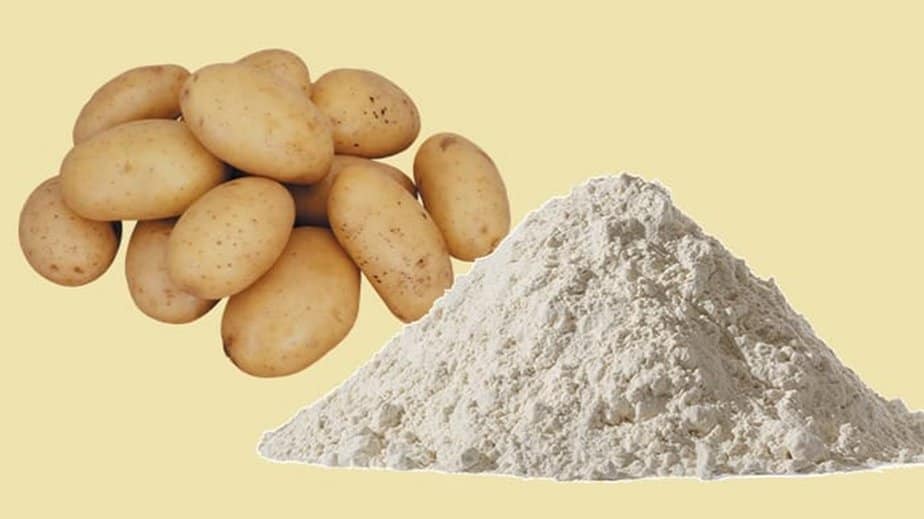Sometimes, you may badly need a potato starch substitute, especially when you don’t have it in your pantry.
Potato starch is a commonly used food-thickening agent. For some folks, it is an essential ingredient in some popular recipes, especially in cake making.
For some reason, if you cannot use potato starch, you may want to find an alternative. In this article, you will read about the best replacements for potato starch.
What is potato starch?
The root tubers of the potato plant contain starch grains (also called leucoplasts) in their cells. We can make potato starch by extracting the starch grains from the potato tuber.
First, you have to crush the potato tubers into pulp to get the starch. In this process, the starch grains are released from the destroyed cells. The starch is then washed out and dried into a powder.
The dried starch obtained from potatoes is a fine white powder with tiny oval-shaped granules.
Some of the prominent features of potato starch are:
- contains minimal amounts of protein and fat,
- taste and flavor are very neutral,
- a gluten-free diet,
- contains 357 calories per 100 grams,
- has considerable dietary fiber, vitamin B6, potassium, and magnesium.
Culinary uses
Potato starch and its derivatives are used in many recipes and food processing. It is an excellent food thickening agent and also helps to conserve food.
This gluten-free starch is popularly used in:
- noodles
- wine gums
- potato chips
- hot dog
- cocktail nuts
- instant soups and sauces
- bakery creams
- kosher foods
Non-culinary uses
The starch extract from potatoes has several non-culinary or commercial uses as well. This starch has been recently introduced to the pharmaceutical and cosmetics industries for manufacturing pastes, plasters, dressings, powders, and creams. It is also used in antibiotics, as it helps dissolve them better in the body.
Some of the common non-culinary uses include:
- Glue/adhesive making
- Textile manufacturing
- Paper coating
- Gummed papers and tapes
Potato starch is washed from crushed potatoes and dried to fine, white flour. It’s commonly used to thicken stews, soups, sauces, puddings, and custards.
Best Potato Starch Substitutes
If you are looking for a replacement for potato starch, you have many options. Fortunately, some of these alternatives may already be on your kitchen shelf.
The following are some of the best substitutes for potato starch.
1. Tapioca starch
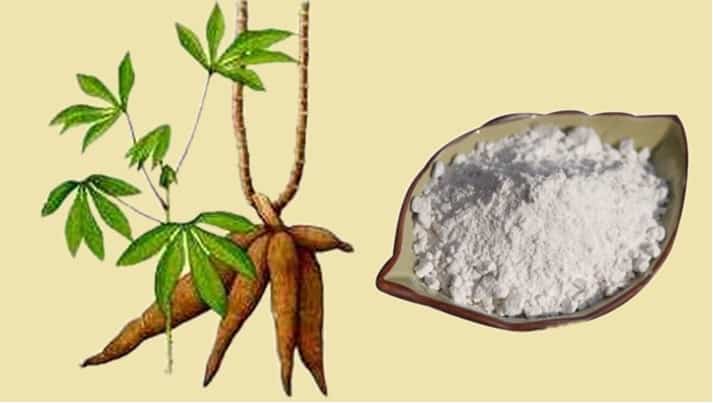
Tapioca and potatoes are both identical tubers. For this reason, they share several similarities.
Tapioca starch, or flour, is a great alternative to potato starch.
Also, tapioca starch is a gluten-free powder. It fits well in baking and works as a food-thickening agent.
Tapioca starch has a slightly lower thickening consistency in comparison to potato starch. So, you need to use a little more tapioca starch while substituting.
Tapioca starch does not withstand overheating during cooking. Use it in the last minutes of adding ingredients to your cooking.
Summary: Tapioca starch is a gluten-free alternative to potato starch. It is a thickener that works well in puddings, soups, and gravies.
2. Arrowroot Starch
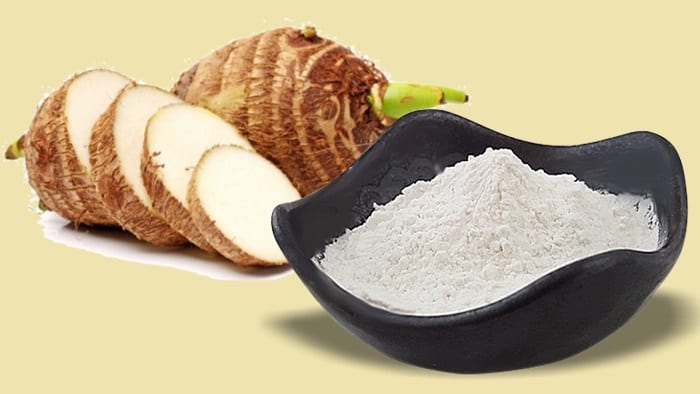
Arrowroot starch, or flour, is another tuber starch similar to potato starch.
Moreover, arrowroot flour is a gluten-free starch with several nutritional benefits. It is more versatile and beneficial than potato flour.
Arrowroot powder is a thickening agent that adds texture and structure to cooking and baking applications. Most importantly, unlike tapioca flour, it does not break down in acidic liquids.
Arrowroot flour has a thinner consistency than potato flour. In baking, replace 1 tablespoon of potato starch with 2 tablespoons of arrowroot starch.
Summary: Instead of potato flour, arrowroot powder can thicken gravies, soups, sauces, and stews. Arrowroot is great for metabolism, circulation, and heart health.
3. Cornstarch
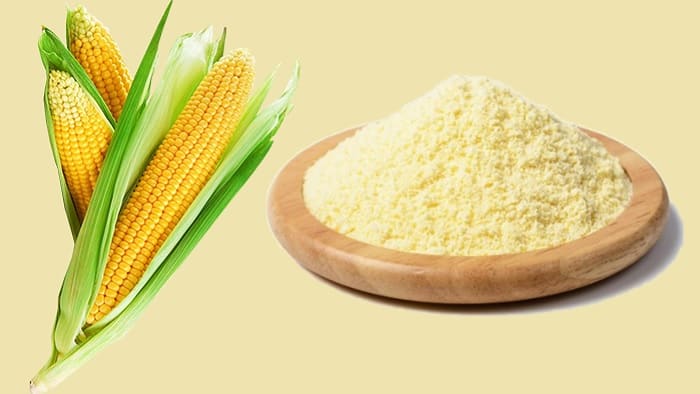
Cornstarch is easily available and easy to use in baking and cooking. Perhaps, it’s the most commonly used starch substitute.
Like potato flour, it is also a thickening agent in food processing. It suits liquid-based foods like sauces, gravies, custards, and soup.
Cornstarch is suitable for mixing with lower-temperature liquid dishes to form a paste or slurry-like consistency.
Some chefs prefer cornstarch to potato starch because it forms a translucent rather than an opaque mixture.
It has a neutral flavor and tastes like potato flour.
You can swap cornstarch and potato starch in a 1:1 ratio.
Summary: Cornstarch is the best replacement for potato starch. It is used as a thickening agent in liquid-based foods. Cornstarch gives a translucent texture to baked foods.
4. Rice Flour
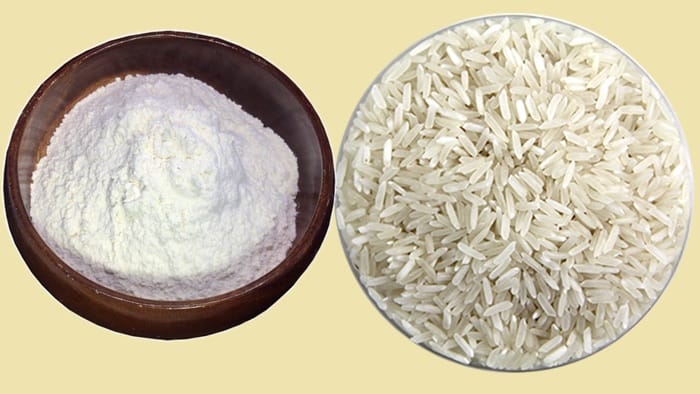
Rice flour is comparatively a weak thickener. But still a suitable gluten-free replacement for potato starch.
If a recipe calls for potato starch, sweet rice flour is one of the last substitute options. It works well for thickening stews and soups but is unsuitable for other recipes. It does have a slightly sweet flavor.
It has a neutral taste and flavor with a light texture. In addition, rice flour is somewhat gritty and heavier than tapioca and arrowroot starches.
Most chefs recommend using rice flour at the beginning of cooking and allowing it to cook slowly.
Because of its light texture, you need to use it in more quantity than potato flour when substituting.
Summary: Rice flour is not a great thickener like potato starch. However, this gluten-free flour can be used as a thickener in soups and stews instead of potato starch.
5. Wheat flour
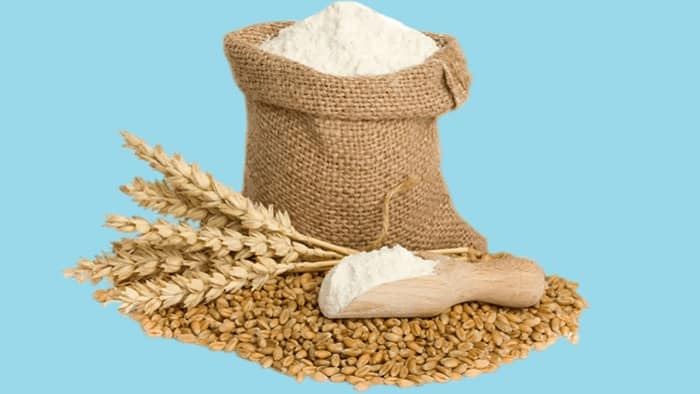
Wheat flour is a fine alternative to potato starch.
Unfortunately, it is not a good option for gluten-free starch.
Like potato flour, it is also a good thickener. It is an all-purpose flour when making a roux. Wheat flour is a nice thickener for sauce and gravy for meat.
Also, using whole wheat flour in cooking does not change the texture or color. It adds a subtle, nutty flavor to your dish.
Unlike potato flour, adding wheat flour to your dishes can result in clumps if you cook it too quickly.
While substituting wheat flour with potato starch, you require a smaller quantity of wheat flour.
Summary: Wheat flour can be a substitute for potato flour when you have no other substitutes available at hand. It isn’t a gluten-free diet.
Frequently Asked Questions
Can I use coconut flour to replace potato starch?
Coconut flour and potato starch are different ingredients with unique properties. Thus, it may not be an ideal substitution in all recipes. Using coconut flour instead of potato starch may produce a denser, drier product. Because coconut flour tends to absorb more liquid than starch extract from potatoes.
Does the starch extract from potatoes contain gluten?
Potato extracts are gluten-free. This starch is a great gluten-free plain flour alternative in some recipes.
Can I use instant mashed potato as a potato starch alternative?
While instant mashed potato flakes are made from potato starch, they are not a direct substitute for potato flour. It contains other ingredients like milk powder, salt, and butter that can alter the flavor and texture of your recipe.
Final Thought
Gluten-free potato starch is a key ingredient in food processing. It is one of the best thickening ingredients in baking and cooking.
If you do not stock potato starch, you can use any other good starch instead.
Our preferred top substitutes for potato starch, in order, are cornstarch, tapioca starch, and arrowroot flour. They are extremely versatile and fine powders, making anything from humble French fry to baked goods.
Wheat and rice flour can also be used as replacements for potato starch.
Related Stories
- What can I use instead of filé powder?
- Can I use potato starch instead of arrowroot powder?
- Can I replace cassava flour with tapioca flour?
